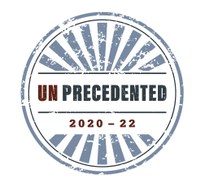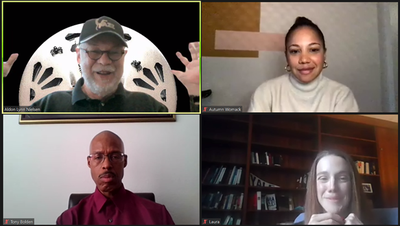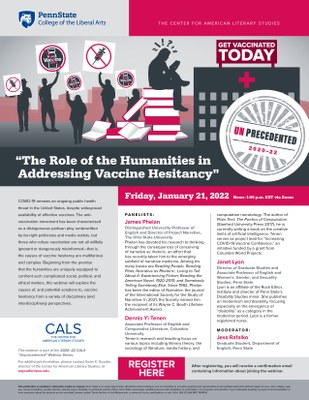“Unprecedented” Now and Beyond: On Year Two of CALS’s Webinar Series

 CALS’s “Unprecedented” webinar series is no longer unprecedented. Launched last year in response to the media’s overuse of the titular term to describe any number of COVID-19’s impacts, CALS’s “Unprecedented” series kicked off its second season last month, the first webinar in a slate of five taking place across this academic year. Though no longer unprecedented, the 2021/22 series can hardly be called expected. As CALS Director Sean Goudie explains, “we really had no idea whether or not the series would survive the 2020-21 year let alone be renewed for a second year given its ‘Unprecedented’ focus and, for our center, format.” Of these two variables, focus and format, the latter has been the foundation of the series’s extension into year two and, possibly, beyond.
CALS’s “Unprecedented” webinar series is no longer unprecedented. Launched last year in response to the media’s overuse of the titular term to describe any number of COVID-19’s impacts, CALS’s “Unprecedented” series kicked off its second season last month, the first webinar in a slate of five taking place across this academic year. Though no longer unprecedented, the 2021/22 series can hardly be called expected. As CALS Director Sean Goudie explains, “we really had no idea whether or not the series would survive the 2020-21 year let alone be renewed for a second year given its ‘Unprecedented’ focus and, for our center, format.” Of these two variables, focus and format, the latter has been the foundation of the series’s extension into year two and, possibly, beyond.
The webinars’ one-hour length, composed of brief back-to-back opening statements by panelists and a moderated Q&A, is the main way that the second season is “following precedent,” in Goudie’s words. The format has been impactful not just because of its logistical advantages, enabling a wider possible audience, logging onto Zoom, than could conceivably be expected to visit at an in-person event. More importantly, the format has proven particularly well-suited to both staging a diverse array of topics and facilitating productive discussions therein. For Eunice Toh, who as last year’s CALS Graduate RA served as the graduate student lead on the first “Unprecedented” organizing committee, the “huge benefit” of the webinar format “is its allowance for creative ways of thinking about the anchoring ‘keyword.’” With “relatively few webinars specifically related to COVID” last year, as Toh explains, the COVID-inflected “Unprecedented” keyword has done anything but limit the webinars’ content.
-

Q+A session at the “‘Grown Deep Like the Rivers’” webinar. Top row (L-R): Aldon Lynn Nielsen (Penn State), Autumn Womack (Princeton); Bottom row (L-R): Tony Bolden (U of Kansas), Moderator Laura Vrana (U of South Alabama)
Indeed, as Laura Vrana experienced when moderating the first webinar of this academic year, “‘Grown Deep Like the Rivers’: The Black Lives Matter Movement(s) from Langston Hughes to the Present,” the “unprecedented” keyword as such tends not to dominate the stage. Vrana notes of the panelists’ remarks, which centered on the centennial publication of Langston Hughes’s influential poem “The Negro Speaks of Rivers,” that “none engaged with the ‘unprecedented’ nature of Hughes’s vital poem as overtly as I had anticipated.” Instead, the keyword’s charge reverberated in more implicit ways. Tony Bolden (University of Kansas), for example, argued Hughes’s poem was an opportunity to view the poet in an unconventional, if not unprecedented, way: as a theorist of political action in addition to as a poet of political value. Similarly, Autumn Womack (Princeton University) offered an idiosyncratic pedagogical and theoretical treatment of Hughes’s poem, situating it as an ending hinge-point in her classroom’s coverage of the long nineteenth century, and as a mediating force in its original publication in The Crisis. Finally, Aldon Lynn Nielsen (Penn State) foregrounded the poem’s relationship to sound and music, a counterintuitive methodological approach in its own right. For Vrana, the webinar’s format played no small part in enabling this productive and diverse group of responses: “Encouraging scholars to keep opening comments quite brief does,” she says, “ultimately foster better engagement around the topic between them and everyone.”
The remaining webinars this year figure to continue the series’s treatment of diverse topics, even as the “unprecedented” elements of the pandemic threaten to become only more predictable and ‘normal.’ In a sense, the pandemic’s evolution toward endemic status only spotlights what Goudie calls the “use and abuse” of the key term that spurred the genesis of CALS’s series in the first place. True to form, the webinar series has only complexified the inflections and stakes of various registers of the unprecedented, and its second year looks to continue that trend, beginning with its next two webinars, which put the university generally—and the humanities specifically—front and center.
-

CALS’s second webinar of this academic year, “The Role of the Humanities in Addressing Vaccine Hesitancy,” will launch January 21.
On January 21, “The Role of the Humanities in Addressing Vaccine Hesitancy” will cover the still-pressing issue, as COVID-19 variants continue to emerge, of vaccine hesitancy in the US. Moderator Jess Rafalko, also a graduate student committee member of the “Unprecedented” organizing team this year, hopes the webinar will “offer a more nuanced perspective on what is obviously a complicated issue.” The webinar presumes the humanities’ unique positioning to provide just such a perspective—not an unprecedented perspective, that is, but a similarly singular one that promises to yield responses as diverse as the make-up of the webinar’s panel. In assembling the panel, Rafalko notes that featuring scholars working in English departments but who are invested in “interdisciplinary" research was crucial. Thus, James Phelan (Ohio State) brings research in narrative theory and the medical humanities to the fore; Dennis Yi Tenen (Columbia University), meanwhile, not only works in digital humanities but also co-leads Columbia University’s project to increase vaccine confidence; and Janet Lyon (Penn State) supplements her field-defining work in disability studies with her practical past experience as a registered nurse. Altogether, the research backgrounds of these panelists each provide in their own way a “unique” angle, in Rafalko’s words, “to viewing the complex nature of vaccine hesitancy.”
The third webinar of the academic year keeps focus on the university and especially the English department, covering the latter’s representation on the popular Netflix series The Chair. On February 18, Dorothy Wang (Williams College), Rebecca L. Walkowitz (Rutgers University), and Cynthia A. Young (Penn State) will participate in a discussion moderated by Leland Tabares (Loyola University New Orleans) about what the show gets right and wrong in its depiction of classroom culture, professorial relationships, and bureaucratic concerns from the banal (class enrollment) to the punitive (professor expulsion).
Critically, these two webinars feature another significant advantage of the webinar series format. In both of these cases, the webinars act as an explicit space of contact between the academy and the so-called real world. But the Zoom-based format implicitly carried this potential from the start, enabling non-academic speakers to share the stage with scholars. As Su Young Lee, a member of last year’s “Unprecedented” organizing committee, nicely puts it, “it’s easy to feel like academia or the ‘literary’ exists within a bubble separate from the rest of the world.” In refusing this distinction, the webinars “open up,” in Lee’s words, “conversations between people inside and outside the academy.” Rafalko agrees, noting this as the very core of the “Vaccine Hesitancy” webinar: “to find out how the work we do in the academy can translate to—and do real, appreciable good in—the larger world.”
Connecting academic and non-academic spaces is just one of the several advantages inherent to the webinar format that presages a fortuitous future for the series. While it is difficult to speculate what exactly that future holds—as the pandemic has only too clearly demonstrated—one thing that promises to ensure the series’s innovative output is the collaborative nature of its organization by Goudie and the organizing committee members, which this year include Rafalko and fellow Penn State English graduate students Joe Glinbizzi and Justus Berman, as well as CALS undergraduate intern Phoebe Cykosky. It is this “collective, team effort,” as Goudie says, working with the distinct concerns brought by each individual member, that facilitates the webinars’ dynamic range of themes. Should the webinar series continue past this year, it will perhaps be neither unprecedented nor unexpected, but, propelled by its collaborative creative engine, a matter of momentum.

 CALS’s “Unprecedented” webinar series is no longer unprecedented. Launched last year in response to the media’s overuse of the titular term to describe any number of COVID-19’s impacts, CALS’s “Unprecedented” series kicked off its second season last month, the first webinar in a slate of five taking place across this academic year. Though no longer unprecedented, the 2021/22 series can hardly be called expected. As CALS Director Sean Goudie explains, “we really had no idea whether or not the series would survive the 2020-21 year let alone be renewed for a second year given its ‘Unprecedented’ focus and, for our center, format.” Of these two variables, focus and format, the latter has been the foundation of the series’s extension into year two and, possibly, beyond.
CALS’s “Unprecedented” webinar series is no longer unprecedented. Launched last year in response to the media’s overuse of the titular term to describe any number of COVID-19’s impacts, CALS’s “Unprecedented” series kicked off its second season last month, the first webinar in a slate of five taking place across this academic year. Though no longer unprecedented, the 2021/22 series can hardly be called expected. As CALS Director Sean Goudie explains, “we really had no idea whether or not the series would survive the 2020-21 year let alone be renewed for a second year given its ‘Unprecedented’ focus and, for our center, format.” Of these two variables, focus and format, the latter has been the foundation of the series’s extension into year two and, possibly, beyond.
The webinars’ one-hour length, composed of brief back-to-back opening statements by panelists and a moderated Q&A, is the main way that the second season is “following precedent,” in Goudie’s words. The format has been impactful not just because of its logistical advantages, enabling a wider possible audience, logging onto Zoom, than could conceivably be expected to visit at an in-person event. More importantly, the format has proven particularly well-suited to both staging a diverse array of topics and facilitating productive discussions therein. For Eunice Toh, who as last year’s CALS Graduate RA served as the graduate student lead on the first “Unprecedented” organizing committee, the “huge benefit” of the webinar format “is its allowance for creative ways of thinking about the anchoring ‘keyword.’” With “relatively few webinars specifically related to COVID” last year, as Toh explains, the COVID-inflected “Unprecedented” keyword has done anything but limit the webinars’ content.
-

Q+A session at the “‘Grown Deep Like the Rivers’” webinar. Top row (L-R): Aldon Lynn Nielsen (Penn State), Autumn Womack (Princeton); Bottom row (L-R): Tony Bolden (U of Kansas), Moderator Laura Vrana (U of South Alabama)
Indeed, as Laura Vrana experienced when moderating the first webinar of this academic year, “‘Grown Deep Like the Rivers’: The Black Lives Matter Movement(s) from Langston Hughes to the Present,” the “unprecedented” keyword as such tends not to dominate the stage. Vrana notes of the panelists’ remarks, which centered on the centennial publication of Langston Hughes’s influential poem “The Negro Speaks of Rivers,” that “none engaged with the ‘unprecedented’ nature of Hughes’s vital poem as overtly as I had anticipated.” Instead, the keyword’s charge reverberated in more implicit ways. Tony Bolden (University of Kansas), for example, argued Hughes’s poem was an opportunity to view the poet in an unconventional, if not unprecedented, way: as a theorist of political action in addition to as a poet of political value. Similarly, Autumn Womack (Princeton University) offered an idiosyncratic pedagogical and theoretical treatment of Hughes’s poem, situating it as an ending hinge-point in her classroom’s coverage of the long nineteenth century, and as a mediating force in its original publication in The Crisis. Finally, Aldon Lynn Nielsen (Penn State) foregrounded the poem’s relationship to sound and music, a counterintuitive methodological approach in its own right. For Vrana, the webinar’s format played no small part in enabling this productive and diverse group of responses: “Encouraging scholars to keep opening comments quite brief does,” she says, “ultimately foster better engagement around the topic between them and everyone.”
The remaining webinars this year figure to continue the series’s treatment of diverse topics, even as the “unprecedented” elements of the pandemic threaten to become only more predictable and ‘normal.’ In a sense, the pandemic’s evolution toward endemic status only spotlights what Goudie calls the “use and abuse” of the key term that spurred the genesis of CALS’s series in the first place. True to form, the webinar series has only complexified the inflections and stakes of various registers of the unprecedented, and its second year looks to continue that trend, beginning with its next two webinars, which put the university generally—and the humanities specifically—front and center.
-

CALS’s second webinar of this academic year, “The Role of the Humanities in Addressing Vaccine Hesitancy,” will launch January 21.
On January 21, “The Role of the Humanities in Addressing Vaccine Hesitancy” will cover the still-pressing issue, as COVID-19 variants continue to emerge, of vaccine hesitancy in the US. Moderator Jess Rafalko, also a graduate student committee member of the “Unprecedented” organizing team this year, hopes the webinar will “offer a more nuanced perspective on what is obviously a complicated issue.” The webinar presumes the humanities’ unique positioning to provide just such a perspective—not an unprecedented perspective, that is, but a similarly singular one that promises to yield responses as diverse as the make-up of the webinar’s panel. In assembling the panel, Rafalko notes that featuring scholars working in English departments but who are invested in “interdisciplinary" research was crucial. Thus, James Phelan (Ohio State) brings research in narrative theory and the medical humanities to the fore; Dennis Yi Tenen (Columbia University), meanwhile, not only works in digital humanities but also co-leads Columbia University’s project to increase vaccine confidence; and Janet Lyon (Penn State) supplements her field-defining work in disability studies with her practical past experience as a registered nurse. Altogether, the research backgrounds of these panelists each provide in their own way a “unique” angle, in Rafalko’s words, “to viewing the complex nature of vaccine hesitancy.”
The third webinar of the academic year keeps focus on the university and especially the English department, covering the latter’s representation on the popular Netflix series The Chair. On February 18, Dorothy Wang (Williams College), Rebecca L. Walkowitz (Rutgers University), and Cynthia A. Young (Penn State) will participate in a discussion moderated by Leland Tabares (Loyola University New Orleans) about what the show gets right and wrong in its depiction of classroom culture, professorial relationships, and bureaucratic concerns from the banal (class enrollment) to the punitive (professor expulsion).
Critically, these two webinars feature another significant advantage of the webinar series format. In both of these cases, the webinars act as an explicit space of contact between the academy and the so-called real world. But the Zoom-based format implicitly carried this potential from the start, enabling non-academic speakers to share the stage with scholars. As Su Young Lee, a member of last year’s “Unprecedented” organizing committee, nicely puts it, “it’s easy to feel like academia or the ‘literary’ exists within a bubble separate from the rest of the world.” In refusing this distinction, the webinars “open up,” in Lee’s words, “conversations between people inside and outside the academy.” Rafalko agrees, noting this as the very core of the “Vaccine Hesitancy” webinar: “to find out how the work we do in the academy can translate to—and do real, appreciable good in—the larger world.”
Connecting academic and non-academic spaces is just one of the several advantages inherent to the webinar format that presages a fortuitous future for the series. While it is difficult to speculate what exactly that future holds—as the pandemic has only too clearly demonstrated—one thing that promises to ensure the series’s innovative output is the collaborative nature of its organization by Goudie and the organizing committee members, which this year include Rafalko and fellow Penn State English graduate students Joe Glinbizzi and Justus Berman, as well as CALS undergraduate intern Phoebe Cykosky. It is this “collective, team effort,” as Goudie says, working with the distinct concerns brought by each individual member, that facilitates the webinars’ dynamic range of themes. Should the webinar series continue past this year, it will perhaps be neither unprecedented nor unexpected, but, propelled by its collaborative creative engine, a matter of momentum.